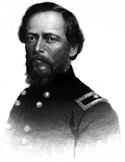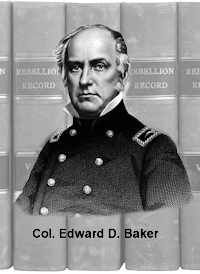Near Point Pleasant, Mo., March 18, ’62.
 You see we are creeping along down the river surely if the motions are a little slow. This is about 12 miles below Madrid and said to be 75 or 80 below Cairo. It is said that the Rebels have between a dozen and 20 steamboats above here, and I think the object in occupying this point and planting artillery here is to make the assurances we have of catching them, doubly sure, for the river is considerably less in width here than where our guns are at and near Madrid. We received orders to march about sunset last night and started at tattoo. ‘Twas a beautiful ride. The road lay for nearly the whole distance right along the river bank. ‘Twas warm enough without overcoat or gloves and Commander Foote added to the interest of the ride by his sleep-disturbing music up at Island 10. The river makes a horseshoe bend here and Island 10 lays almost directly east of here across the peninsula. The neck is very flat, and we could plainly see the flash of every gun and see the bombs burst in the air when more than 20 or 30 yards from the ground. The roar of the 13 and 16-inch mortars is truly terrific. There was no difficulty in distinguishing their reports from the cannons. The evidences of an earthquake having performed in this country are visible when pointed out. The natives will show you a swamp and say that was once inhabitable, and then they’ll point out a sand ridge about four feet nearer heaven (the surface of course)! and say that was a swamp. Well, we arrived here: at 2 o’clock last night and moved nearly two miles back from the river to be out of range of a battery the enemy have planted on the opposite shore. This two miles, after deducting about 300 yards where the road runs through the little town, was a swamp of mud and water to the horses’ bellies. I noticed our flag flying on the river bank over an inverted Rebel rag. The flag staff was in front of a store that had received three cannon shots from the Rebels in their efforts to cut down our flag. Nearly every house in town has had one or more doses of heavy iron and several have been burned by shells: General Palmer is five miles below here with his brigade. He was lucky enough yesterday to disable two Rebel gunboats out of three that attacked him. I am very anxious to get out of this country and into Tennessee if possible, or if we have to stay on this side, enough below the swamps to make it a little more pleasant. That ride of last night was delicious. The order was to march without any unnecessary noise, and after 10:30 (it was 2 when we got here), the boys were all perfectly quiet, many of them asleep, and I believe I enjoyed myself better than I ever did before m my life. Can’t begin to tell you precisely why, except there might have been some air-castle building, but ’twas very pleasant. I hear to-night that Island 10 was evacuated last night. Think maybe Foote has his hands full up there, and doubt the evacuation idea some. Gracious how it rained last night, commenced just after we got here, with some awful heavy thunder and don’t know how long it lasted. ‘Twas raining to kill when I went to sleep. We had no tents with us and every fellow provided for himself. I went to bed with a lot of bacon and a barrel under a tent fly and slept a la log. To-day it has been real warm. Shirt sleeves and shade were in requisition. Well, I’ll write you a little every day until I can send kittens.
You see we are creeping along down the river surely if the motions are a little slow. This is about 12 miles below Madrid and said to be 75 or 80 below Cairo. It is said that the Rebels have between a dozen and 20 steamboats above here, and I think the object in occupying this point and planting artillery here is to make the assurances we have of catching them, doubly sure, for the river is considerably less in width here than where our guns are at and near Madrid. We received orders to march about sunset last night and started at tattoo. ‘Twas a beautiful ride. The road lay for nearly the whole distance right along the river bank. ‘Twas warm enough without overcoat or gloves and Commander Foote added to the interest of the ride by his sleep-disturbing music up at Island 10. The river makes a horseshoe bend here and Island 10 lays almost directly east of here across the peninsula. The neck is very flat, and we could plainly see the flash of every gun and see the bombs burst in the air when more than 20 or 30 yards from the ground. The roar of the 13 and 16-inch mortars is truly terrific. There was no difficulty in distinguishing their reports from the cannons. The evidences of an earthquake having performed in this country are visible when pointed out. The natives will show you a swamp and say that was once inhabitable, and then they’ll point out a sand ridge about four feet nearer heaven (the surface of course)! and say that was a swamp. Well, we arrived here: at 2 o’clock last night and moved nearly two miles back from the river to be out of range of a battery the enemy have planted on the opposite shore. This two miles, after deducting about 300 yards where the road runs through the little town, was a swamp of mud and water to the horses’ bellies. I noticed our flag flying on the river bank over an inverted Rebel rag. The flag staff was in front of a store that had received three cannon shots from the Rebels in their efforts to cut down our flag. Nearly every house in town has had one or more doses of heavy iron and several have been burned by shells: General Palmer is five miles below here with his brigade. He was lucky enough yesterday to disable two Rebel gunboats out of three that attacked him. I am very anxious to get out of this country and into Tennessee if possible, or if we have to stay on this side, enough below the swamps to make it a little more pleasant. That ride of last night was delicious. The order was to march without any unnecessary noise, and after 10:30 (it was 2 when we got here), the boys were all perfectly quiet, many of them asleep, and I believe I enjoyed myself better than I ever did before m my life. Can’t begin to tell you precisely why, except there might have been some air-castle building, but ’twas very pleasant. I hear to-night that Island 10 was evacuated last night. Think maybe Foote has his hands full up there, and doubt the evacuation idea some. Gracious how it rained last night, commenced just after we got here, with some awful heavy thunder and don’t know how long it lasted. ‘Twas raining to kill when I went to sleep. We had no tents with us and every fellow provided for himself. I went to bed with a lot of bacon and a barrel under a tent fly and slept a la log. To-day it has been real warm. Shirt sleeves and shade were in requisition. Well, I’ll write you a little every day until I can send kittens.






